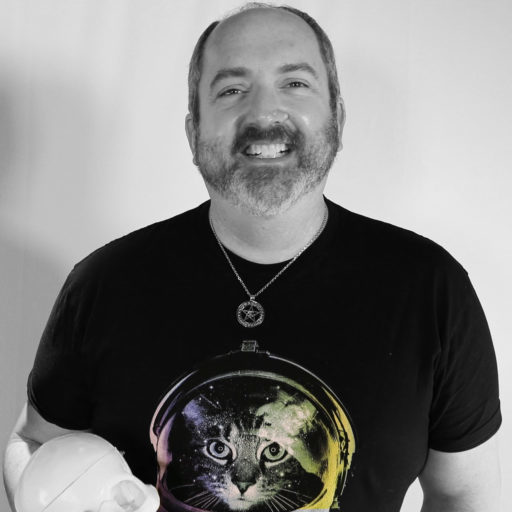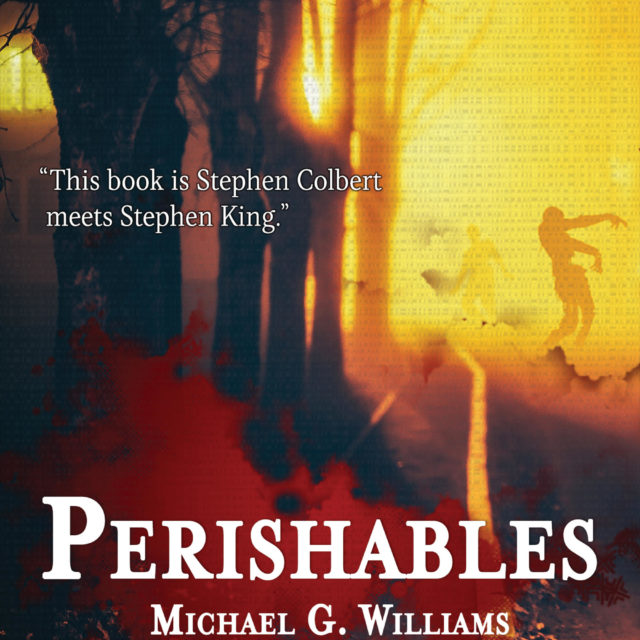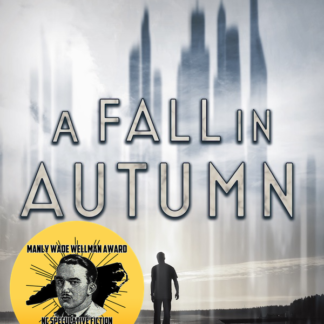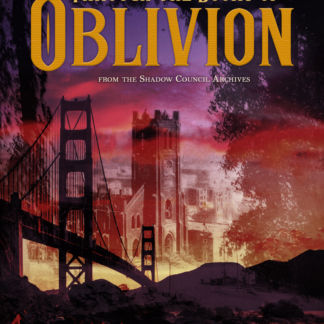Versatile and talented, Michael G, Williams is the winner of the 2020 Manly Wade Wellman Award, an honor which he richly deserved. He’s also the the author of the Withrow Chronicles, a series of books about a vampire living in modern North Carolina, a series of time-traveling adventures featuring the legendary Emperor Norton, and more. He also co-hosts the deliriously enjoyable Arcane Carolinas podcast, and he’s a staple on the North Carolina speculative fiction scene. It is my pleasure to present to you Five For Writing with Michael G. Williams.

1-Why vampires? And why in North Carolina?
I always (only?) want to write about the queer experience in some way, and vampires are the perfect metaphor for how I want to represent my own experiences as a gay man. They’re always among humans but never quite of them and never quite free of them. They might choose to “pass” as human, they might not, and mostly I imagine they would find themselves negotiating that choice contextually, night to night, moment to moment, century to century. They have a secret truth they know many people actively fear and would readily attack them for revealing, and sometimes they most feel themselves only in situations they feel they must never reveal for fear of facing hatred. Each of those aligns in some way with significant elements of my own experience as a gay man living in a cishet world. From the first time I read Interview with the Vampire (may Anne Rice rest in well-earned peace), I’ve always seen vampirism as a useful mirror for reflecting back some of my own life as a queer person.
As for why NC, in part because I’ve lived here all my life and know it so well. Locations are easier to capture and convey when we’ve literally been there, and every book in The Withrow Chronicles is about a place I know well from firsthand experience. But also North Carolina because I love fish-out-of-water stories and the idea of a vampire getting by in the southeastern United States was a great chance to present several different takes on that and set up some interesting tension. Compelling characters, for me, always start in a place of untenable circumstances. Right out of the gate I want them in a place (literal or otherwise) they can’t stay. A vampire in suburban North Carolina would be running huge risks that might not even occur to us–or to them. The southeastern United States is a place where religion can be especially acidic and deviation from the mean can be met with especially sharp suspicion. That’s also true of the suburbs, regardless of region. I wanted to play with the idea of a vampire living in a suburban neighborhood with all the nosy neighbors and big box stores and everything else that involves, and how he handles it when his truths run headlong into the polite fictions of those environments. Vampire stories are almost always about some equivalent of the monster in the castle on the hill, whether that’s a literal castle or a skyscraper. I wanted a story about a guy who drives a regular car and writes his own check to pay his power bill, not some jetsetting bloodsucker. We have enough jetsetting bloodsuckers in reality.
2-You won the Manly Wade Wellman Award. How has that affected your life?
The biggest thing is that it gave me much-needed confidence to write my weird little stories and not constantly question my own instincts for topics and tone. A Fall in Autumn is a book I felt was uniquely “me” in that it includes some of my favorite flavors and inspirations and genre elements, and when I wrote it I remained absolutely convinced no one else would ever connect with it. Instead, this helped me really learn the lesson that people connect best and most with the stories that speak to us as writers. I used to respond to people who asked me about The Withrow Chronicles by saying, “Well, they’re not for everyone,” and I still think that’s true of everything else I write but the Manly Wade Wellman Award made me much braver with writing what I want to write and feeling confident it will be for someone. It’s also made it easier for me to try to find that someone who will really connect with it. I contend with both generalized anxiety and social anxiety and have never allowed myself to do much promotion out of fear of imagined negative consequences. The validation from winning the Wellman has allowed me to finally start working my way out from behind some of that.
Hand in hand with promoting myself, it gave me a little more of a platform to highlight other writers in the region who are also doing absolutely stunning work. Getting to announce the next winner at ConGregate in 2021, and having it be my friend and colleague Natania Barron, and to have some small role in recognizing her work, and the work of T. Frohock, who was a finalist and was also there, is a real privilege.
3-What is the Arcane Carolinas podcast, and what inspired it?
Arcane Carolinas is SO FUN! My friend and co-host Charlie and I talk about legends, lore, obscure history, and modern oddities found in North and South Carolina. (We originally described it to others as “The X-Files of the Carolinas.”) We’ve talked about everything from the Devil’s Tramping Ground to the Brown Mountain Lights to UFOs over Myrtle Beach to the Ghost Hound of Goshen Hill, South Carolina, and yet there is so much more to discuss! Every location in the Carolinas has something fascinating just under the first coat of paint or the first inch of earth: hidden history, a forgotten story, a local monster, a legend people mostly only hear in a song, you name it. We’ve done episodes that are hard science and episodes where we dig into census records to find out who a figure really was and episodes where we are 100% certain the whole thing was made up, and we’ve loved every one of them. Every place in the Carolinas has a story to tell–more like ten or twelve stories–and I will never get tired of unearthing those and seeing how they shine in the moonlight.
The story of its origins is funny, though, at least to us. Charlie and I used to work together. We already were making a podcast as part of our job, so we knew the tech and we knew we had a good rapport, a good dynamic. Through a series of other people’s departures and desks getting rearranged we wound up in cubes next to each other off on one end of the office, far away from everyone else, which allowed us to let our guard down and admit to enjoying this stuff and really bonding over that. Also, making a show about something purely for fun was a great way to have something to look forward to early in the pandemic and to grow a new community around something we all love.
 4-You bounce around genres quite a bit, from horror/urban fantasy to lighthearted time travel to science fiction noir. Is there one that speaks to you more than the others?
4-You bounce around genres quite a bit, from horror/urban fantasy to lighthearted time travel to science fiction noir. Is there one that speaks to you more than the others?
Oh, I think I’ll always be most interested in vampires and in detectives. (I will, eventually, write a vampire detective.) The vampires and witches who populate The Withrow Chronicles are always in the back of my head, whispering ideas, telling me what they’ve been up to. When the pandemic started, they were the characters I found my mind wandering toward, letting myself noodle around with, wondering how they were coping. (In the case of the vampires, at first they sort of scoffed at how some mortals rejected meaningful precautions that impose no real hardship; eventually they got depressed about what this might mean for the world they plan to live in forever. The witches do a much better job of keeping each other in good spirits but are extremely frustrated at the way magic can’t readily cure a problem of science.) I love all my characters and all my books, but the world I know I’ll go back to some day is The Withrow Chronicles. That’s the one I’m likeliest to grow into an expanded universe of novellas. It’ll just… be a few years.
5-What inspired you to write about Emperor Norton?
Norton embodies so much that is good and so much that is terrible about America, and about the struggles faced–and rewards reaped–by anyone who sets out to make themselves into someone they’ve been told they can never be. Here’s this guy who was king of the hill, a member of the most prestigious social club in San Francisco at the height of the gold rush, trading commodities in such volumes and so shrewdly that he had a very good chance of personally cornering the market on rice, a basic food staple heavily relied on by everyone else in the city. He was one part Dallas, one part tech-bro venture capitalist, and one bad break later, one too-ambitious overreach, he was destitute and totally vanished from the public eye.
 A few years later he walked into the offices of a newspaper, bought a small ad, and used it to declare himself Emperor of the United States and began issuing edicts. Rather than become some bitter, angry person willing to do anything and hurt anyone to get back into that position of privilege, he became a champion of the marginalized. He physically intervened on multiple occasions to stop racist attacks on people of color. He spoke out in favor of desegregating city transit, in favor of women’s suffrage, in favor of building a bridge to connect San Francisco and Oakland, and against judicial discrimination against poor people. City police were instructed to salute him when he passed. Theaters would reserve the best seat in the house on opening night, and if he attended the audience would rise at his entrance. He ate for free in restaurants, he attended lectures in science and medicine. He sold his own imperial treasury notes–and conveniently died a month before they could be redeemed. His image is still found all over San Francisco.
A few years later he walked into the offices of a newspaper, bought a small ad, and used it to declare himself Emperor of the United States and began issuing edicts. Rather than become some bitter, angry person willing to do anything and hurt anyone to get back into that position of privilege, he became a champion of the marginalized. He physically intervened on multiple occasions to stop racist attacks on people of color. He spoke out in favor of desegregating city transit, in favor of women’s suffrage, in favor of building a bridge to connect San Francisco and Oakland, and against judicial discrimination against poor people. City police were instructed to salute him when he passed. Theaters would reserve the best seat in the house on opening night, and if he attended the audience would rise at his entrance. He ate for free in restaurants, he attended lectures in science and medicine. He sold his own imperial treasury notes–and conveniently died a month before they could be redeemed. His image is still found all over San Francisco.
He also wore a mismatched wardrobe of donated clothing and discarded military uniforms and lived in a six-by-nine-foot room in a boarding house where he perpetually struggled to pay a pittance in rent while street vendors sold dolls in his likeness to tourists. People loved the idea of Norton, but the average person who might rise in a theatre or salute him on a city street did precious little to actually help him survive.
Norton spent the last two decades and change of his life scraping to get by and being a cultural force so powerful, and a voice for change so strong, that here we are talking about him a century and a half later–and still struggling with the same issues he tried to get his contemporaries to face. In a city where the neighborhood with the highest rates of homelessness and poverty (the Tenderloin) is bounded by a high-end shopping district (Union Square), startup-offices and tourist attractions (Market Street ), luxury mansions (Nob Hill), and the city’s palaces of government (Civic Center), the story of Emperor Norton is still powerfully relevant.
Norton consciously chose to remake himself, his identity, how he presented himself to the world, and the treatment he would accept as respectful afterward. Again, everything I write is ultimately going to touch on queer themes or otherwise reflect some aspect of the LGBTQIA+ experience as I live it and understand it, and I think a lot of queer people can see something of ourselves in Norton’s story. We do find ourselves culturally powerful, but many LGBTQIA+ people are otherwise politically, financially, and socially marginalized. We grow up in a world that tells us we can’t be who we are, and the more we work to realize who we know ourselves to be–the more we wield that cultural and personal and I’d even say spiritual power–the harder it becomes for us to “make it” in any other realm. Norton’s story is one of powerful personal vision and agency and of being an object of pity, even scorn. I will never not be fascinated by the lessons he can still teach us today.
Many thanks to Michael for giving such thoughtful answers. Check out his books and his website, and you’ll be glad you did!
Next week, I have the pleasure of sharing with you a Five for Writing with Steven Mark Rainey! Until then…